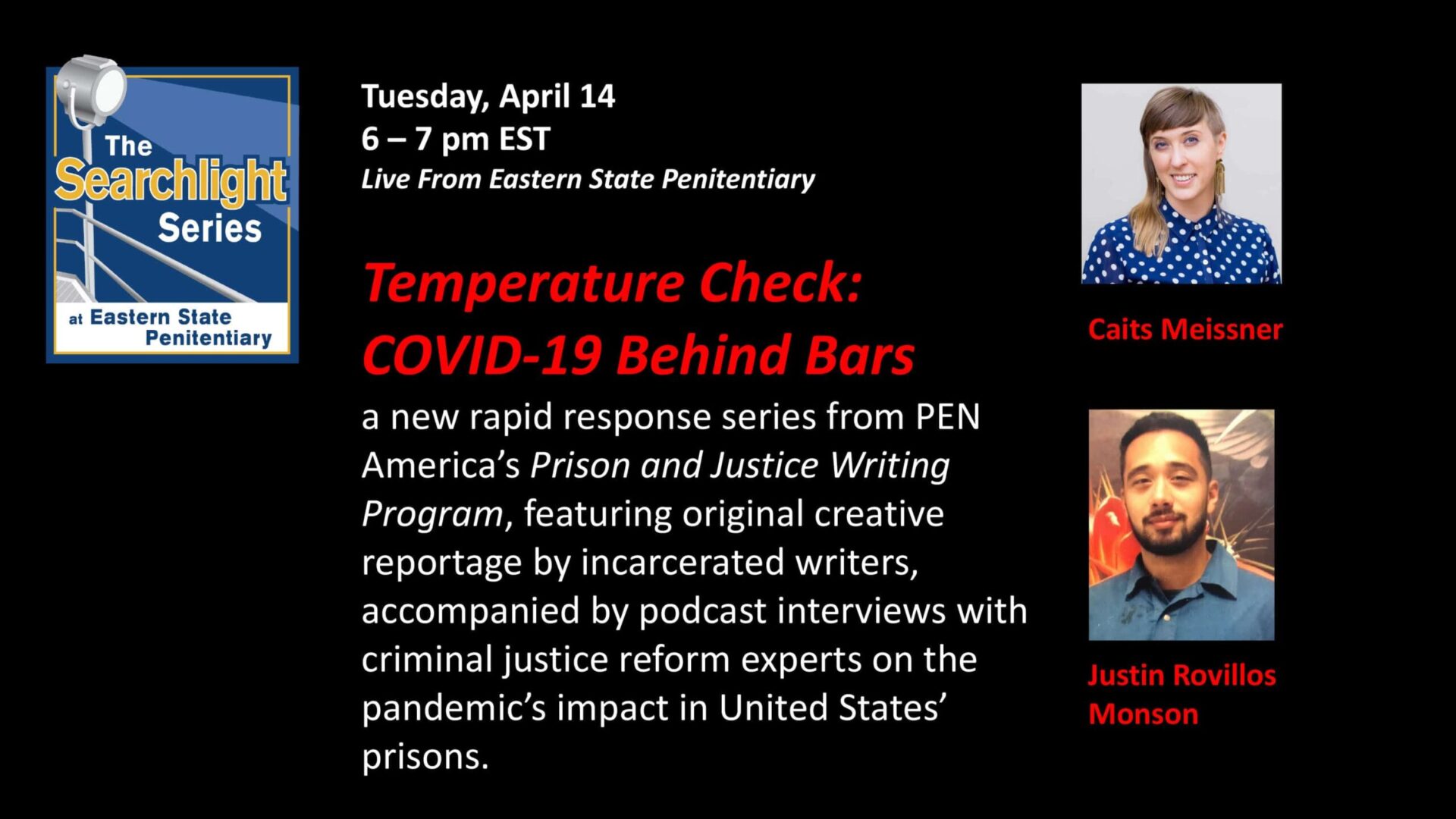
A new rapid response series from PEN America’s Prison and Justice Writing Program, featuring original creative reportage by incarcerated writers, accompanied by podcast interviews with criminal justice reform experts on the pandemic’s impact in United States’ prisons.
To receive this series straight to your inbox, sign up here.
Volume 2.0 Table of Contents
- Introduction to Temperature Check
- Dispatches from Inside: 2 Poems & Prompt by Justin Rovillos Monson
- Podcast: Josie Duffy Rice, President of The Appeal
- Featured Work From the PEN America Justice Community
- Advocacy, Action and Resource Round-Up
Introduction
Dear Readers,
Every week, our pandemic-connected world community sinks deeper into a thick mix of despair, outrage, and heartache. The storm of bad news feels as if it will never run out of rain.
For example: On the heels of Patrick Jones, the first incarcerated person to die of COVID-19 in federal prison on March 28, this past Monday, Michael Tyson—jailed awaiting hearing on a parole technicality—became the first reported coronavirus death on Rikers Island.
Meanwhile, New York State rolls back its landmark bail reforms. Experts argue that furlough efforts in Pennsylvania are not enough to stop the pandemic’s spread in prisons. People on sex offender registries required to report in-person are left with stark choices between health and freedom. And those recently released are struggling to find soft landings in an overtaxed social service system.
And that’s just a handful of recent headlines.
This week’s Temperature Check aims to help you (and ourselves, let’s be honest) face the pandemic’s glaring inequities, while maintaining a thread of calm energy to guide us through turbulent times.
Volume 2 features two heart-opening and stirring poems from inaugural PEN America Writing For Justice Fellow Justin Rovillos Monson. (Psst—If you’re available on April 14, 2020, tune in at 6pm EST for a live conversation between myself and Justin for the Eastern State Penitentiary Historic Site’s Spotlight Series.)
Then, learn through a timely interview with Josie Duffy Rice, President of The Appeal, about how a criminal justice newsroom is pivoting to address the pandemic, how to cull important lessons from this historic moment, and a little tip on finding your peace—fleeting as it may be—by reframing towards future hope.
Wishing you fierce bravery and steady calm, in equal measures.
In solidarity,
Caits Meissner
The PEN America Prison and Justice Writing Team
Caits Meissner, Program Director
Robert Pollock, Program Manager
Kate Cammell, Spring 2020 Program Intern
Elizabeth Fiore, Spring 2020 Program Intern
Dispatches from Inside
For Temperature Check, we’re commissioning currently incarcerated writers to share the direct impact of COVID-19 in prison through creative reportage.
Our second dispatch comes from inuaugural PEN America Writing For Justice Fellow Justin Rovillos Monson, a first generation Filipino-American poet and writer and winner of the inaugural 2017 Kundiman/Asian American Literary Review/Smithsonian Asian Pacific American Center Mentorship in poetry.
Justin’s work has been published, or is forthcoming, in The Asian American Literary Review, Pacifica Literary Review, The Offing, Hayden’s Ferry Review, and elsewhere. He is working on his first collection of poems, and is currently serving a sentence in the Michigan Department of Corrections, from which he hopes to be released in 2027.
Scroll to the end to find an original prompt from the author, offering an entry point into your own creative practice during this challenging time. Respond to Justin’s works by tagging him on social media: @jrovillosmonson on Twitter and on Instagram.

Portrait of Justin by Lisa Lee Herrick for The Rumpus, accompanying a recent publication of four of his poems on March 26, 2020.
Two Pandemic Poems
By Justin Rovillos Monson
Lockdown Language in a World that Does Not Yet Understand the Total Logic of the Cage
Masks are covers strangely unrecognized in this square
mile of American earth where we circle the remnants
of our lives in a world we no longer know by touch
& yes it’s touching it’s true it’s real it’s needed
to write poems & posts & prose to decode
the lows of a lockdown—if anyone knows, well…
& yet we are tethered to no etymology no primary cause
no buzz nor tag nor trend but the siren
heard when it is time to be caged. So, no
we are not amazed by distance.
We are not stirred by silence nor solitude.
Huddle & holding patterns are the states
we have held for longer than supplies
will now last. & that is the language
spoken behind the walls of this land
& its everyday laws. So now, sing your song
& we will listen, just as we always have.
American Quarantine Narrative
I do not understand what this sentence means, I told my captors a decade ago.
My words played on loop, over & over through the door as I sat in my box.
I received no answer as the world arrived in a state of sickness.
I received no answer as the world clawed at the walls of an adjacent box. Some nights, I found comfort in the echoes burrowing through concrete.
(A box, eight by ten feet, can do more than hold your body.)
…I do not understand what this sentence means / I do not understand…
The loop began to alter itself.
There were simple distortions: …I do not / I do not… stretched ad infinitum.
There were cuts & chaos: …Sentence / Sentence / Sen- / I do not…
Low, creeping bass.
Sleep no longer an option, I began to dig through the wall between the world & I.
I never believed my captors would reward my obedience, a string of acts rigged with explosives.
In a vision, I became very sick.
My captors would be forced to feed me medicine, hook my lungs to a machine.
Alas, I remained of decent health, though without enough water.
A ruthless drip of days— …I do not / I do not / I do not…
& in my thirst— …Not this sentence / Not / Not / Not / What this means…
Madness soon followed.
My digging spoon dulled to a useless instrument.
My fingers bled.
On the fortieth day, as the sun began its work, I broke through.
I removed my eye, pressed it through the opening with my outstretched hand.
In the adjacent box, I could see a television attached to a speaker, voices coming forth.
…What this means / Sentence / Sentence / What this means / I do not understand…
On the television: ghosted streets & overflowing hospitals.
The loop: a chorus.
…I do not understand what this sentence means / I do not understand…
I contorted my wrist, eye searching each corner of the adjacent box.
The world was not there.
My captors were not there.
Craft Your Own Rapid Response
Try this creative prompt from Justin Rovillos Monson:
A Quarantine Remix Challenge
This prompt can be engaged as an act of love or reclamation or anything you desire.
Buy a book with a compelling narrative—the longer the better. Read the book. Take notes on plot, character, tone, and the general vibe you get as you read (including those creeping thoughts you have surrounding these days of tumult).
Finish the book. Read your notes. Study your notes. Take notes on your notes. Set notes aside (or burn them in ritual). Tear pages 1-10 out of book.
Create a blackout poem by using a black marker or pen to redact/cross out portions of the pages until a new text emerges. Once complete, lineate/format as desired.
Repeat daily using successive 10 page blocks. After you finish the last 10 pages, set your poems aside for 1 week. You can begin another book during this time. After the week has passed, read and arrange your poems.
You have now remixed a book, and likely have a book of your own.
Keep going.
Respond to Justin’s works by tagging him on social media: @jrovillosmonson on Twitter and on Instagram.
Works of Justice Podcast Interview: Josie Duffy Rice, President of the appeal
 Seeking clarity for our own small contribution to pandemic-era reporting, on Monday, April 5, 2020, PEN America’s Prison and Justice Writing Program intern Kate Cammell asked Josie Duffy Rice, president of The Appeal, and co-host of the Justice In America podcast, for some advice. What is journalism’s role in this historical moment? What criminal justice news items should we be looking for? And, needing it ourselves, how might we stay sane in the process of staying informed?
Seeking clarity for our own small contribution to pandemic-era reporting, on Monday, April 5, 2020, PEN America’s Prison and Justice Writing Program intern Kate Cammell asked Josie Duffy Rice, president of The Appeal, and co-host of the Justice In America podcast, for some advice. What is journalism’s role in this historical moment? What criminal justice news items should we be looking for? And, needing it ourselves, how might we stay sane in the process of staying informed?
Listen to the 21-minute conversation on our Works of Justice podcast:
Or click here to access a transcription.
Featured Work From the PEN America Prison and Justice Community on COVID-19
Current Writing For Justice Fellow Arthur Longworth’s Pandemic Journal just went live on the New York Review of Books this week.
Watch PEN America Writing For Justice Fellow Jonah Mixon-Webster’s “Protocol: Bait/Switch,” now live on The Rumpus, is the first installment of an immersive documentary project which aims to unpack the procedural relations between police officers and civilians in twenty-first-century America. Then read Justin Rovillos Monson’s recent four-poem feature on the same platform.
Join Caits Meissner, PEN America Prison and Justice Writing’s program director, in conversation with Writing For Justice Fellow Justin Rovillos Monson for the Eastern State Penitentiary Historic Site’s Spotlight Series.

Advocacy, Action and Resource Round-Up
The Southern Center for Human Rights has created a handbook to inform incarcerated people about COVID-19. It includes information about symptoms and transmission, measures they may be able to take to protect their health, and how to respond and advocate for themselves and others when those protections don’t exist. The entire handbook is available for you to print and mail, or share with those who have web access.
Our program signed a letter, along with other lead arts-in-corrections organizations in New York State, urging Governor Cuomo to release particularly vulnerable older and immune-compromised men and women who are incarcerated in New York State prisons. Click here for the full text of the letter, and contact the governor to voice your support for this effort. Click here to send him a message, or call (518) 474-8390 / tweet @NYGovCuomo.
View links to last week’s ongoing advocacy efforts, including local movements to get soap and books into the hands of incarcerated writers here.
Further links to advocacy efforts and resources regarding COVID-19 in prisons can be found at The Justice Collaborative’s growing database.
The Marshall Project has been keeping tabs on state responses to the pandemic in prison through this easy to read tracker, and offer round-ups of journalism on the pandemic through their mailing list.

